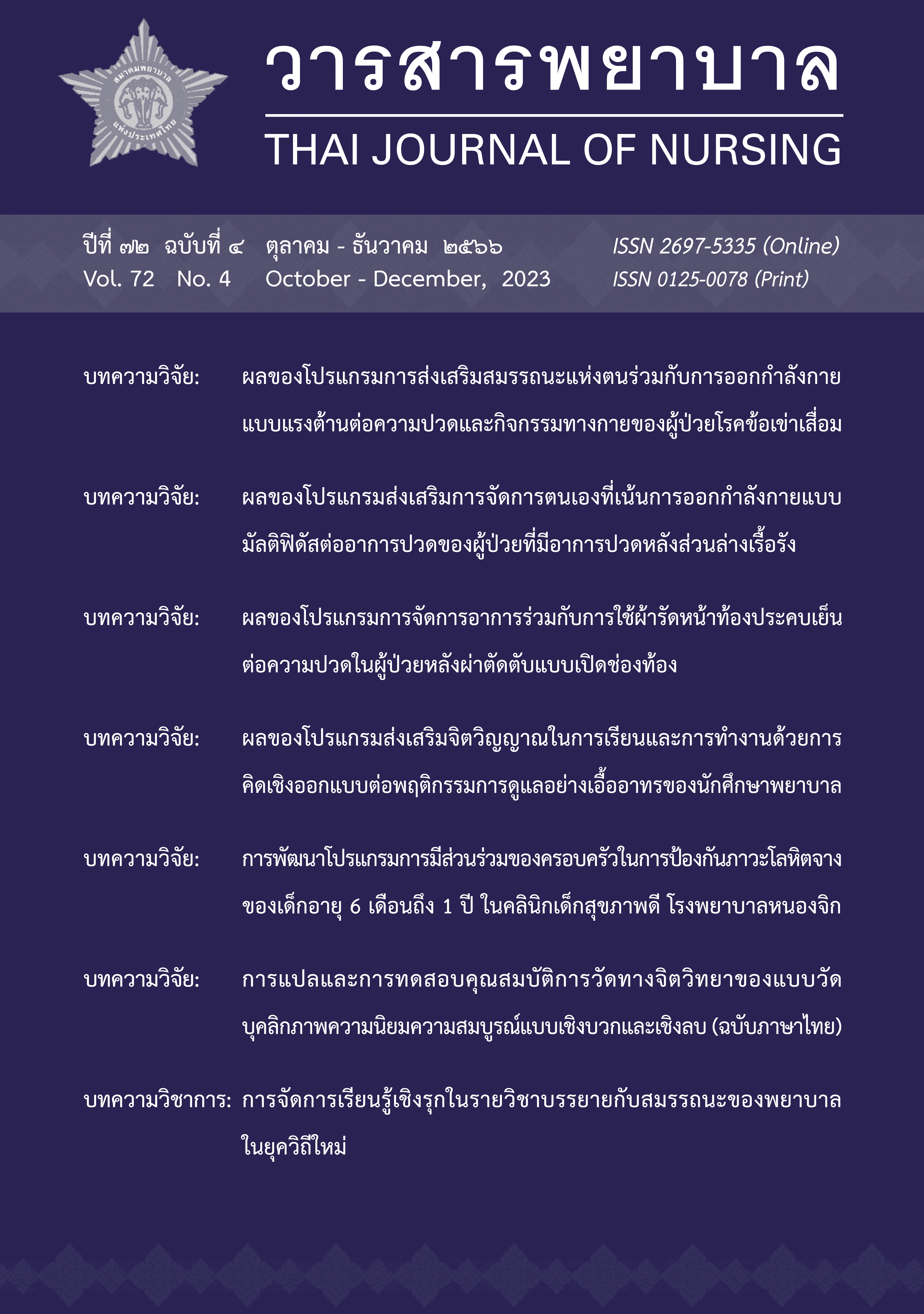The effects of the design thinking promoting spirituality in learning and work program on caring behaviors of nursing students
Main Article Content
Abstract
This quasi-experimental research aimed to study the effects of design thinking promoting spirituality in learning and work program on spirituality in learning and work and caring behaviors of nursing students. The sample consisted of 60 nursing students enrolled in adult and geriatric nursing practice course. They were randomly assigned into the experimental and the control groups, with 30 students per each. The experimental group received the design thinking promoting spirituality in learning and work program while the control group received usual classes. Data were collected using the spirituality in learning and work assessment questionnaire and caring behavior assessment, which had content validity index of 0.92 and 0.95 and Cronbach's alpha coefficient of 0.82 and 0.89 respectively. Descriptive statistics and repeated measures MANOVA were used to analyze the data. The findings showed that nursing students receiving the program had mean scores of spirituality in learning and work, and caring behaviors, that were greater than those of the control group and higher than those of the pre-experimental period. (p < .05).
Article Details

This work is licensed under a Creative Commons Attribution-NonCommercial-NoDerivatives 4.0 International License.
References
ชุติมา เพิงใหญ่, ตวงพร ชุมประเสริฐ, และศรีวัฒนา เพ็ชรรัตน์. (2562). การให้คุณค่าเชิงวิชาชีพของนักศึกษาพยาบาลกับการก้าวสู่วิชาชีพ. วารสารเครือข่ายวิทยาลัยพยาบาลและการสาธารณสุขภาคใต้, 6(3), 221-228.
ฐานิตา ลอยวิรัตน์, กุศล แก้วหนู, และเกศริน คงจันทร์. (2558). การศึกษาสาเหตุและปัจจัยที่ส่งผลต่อการพ้นสภาพการเป็นนักศึกษาระดับปริญญาตรี มหาวิทยาลัยสงขลานครินทร์ (รายงานการวิจัย). มหาวิทยาลัยสงขลานครินทร์.
ธนพล บรรดาศักดิ์, นฤมล จันทรเกษม, อลิษา ทรัพย์สังข์, และวรรณา ชัยชนะรุ่งเรือง. (2564). การป้องกันภาวะซึมเศร้าในนักศึกษาพยาบาล. วารสารวิทยาลัยพยาบาลบรมราชชนนี อุตรดิตถ์, 13(1), 62-70.
นุชจรี กิจวรรณ. (2561). กระบวนการคิดเชิงออกแบบ : มุมมองใหม่ของระบบสุขภาพไทย. วารสารสภาการพยาบาล, 33(1), 5-14.
ภัทราวดี บุตรคุณ, ทิพา ต่อสกุลแก้ว, และวีนัส ลีฬหกุล. (2562). ผลของโปรแกรมการดูแลเอื้ออาทรต่อความวิตกกังวลและการรับรู้พฤติกรรมการดูแลเอื้ออาทรจากพยาบาลในผู้ป่วยที่ได้รับการผ่าตัดกระดูกสันหลังระดับเอว. วารสารโรงพยาบาลเจริญกรุงประชารักษ์, 15(2), 1-13.
รัตติกรณ์ จงวิศาล และ นำชัย ศุภฤกษ์ชัยสกุล. (2560). บทบาทของจิตวิญญาณในการทำงานในการส่งเสริมความยึดมั่นผูกพันของพนักงาน. วารสารพฤติกรรมศาสตร์, 23(2), 167-186.
ศิริพร จิรวัฒน์กุล, ประณีต ส่งวัฒนา, สมพร รุ่งเรืองกลกิจ, วารุณี ฟองแก้ว, วรรณี เดียวอิศเรศ, ศิริอร สินธุ และนันทพันธ์ ชินลํ้าประเสริฐ. (2555). ความสุขกับความคิดคงอยู่ในวิชาชีพของพยาบาลไทย. วารสารสภาการพยาบาล, 27(4), 26-42.
Ashmos, D. P., & Duchon, D. (2000). Spirituality at work: A conceptualization and measure. Journal of Management Inquiry, 9(2), 134–145.
Iqbal, M., Adawiyah, W. R., Suroso, A., & Wihuda, F. (2020). Exploring the impact of workplace spirituality on nurse work engagement: An empirical study on Indonesian government hospitals. International Journal of Ethics and Systems, 36(3), 351-369.
Jin, J., & Lee, E. (2020). Effect of workplace spirituality on quality of work life of nurse cancer survivors in South Korea. Asia-Pacific Journal of Oncology Nursing, 7(4), 346-354.
Jung, S. J., Song, J. E., Bae, S. H., Lee, Y., Gwon, S. H., & Park, J. H. (2023). Simulation-based training program on patient safety management: A quasi-experimental study among new intensive care unit nurses. Nurse Education Today, 126, Article 105823. https://doi.org/10.1016/j.nedt.2023.105823
Kang, M. J., Chung, K. H., & Cho, J. A. (2019). A design and effect of design thinking-based team project learning in nursing clinical practice. The Journal of the Korea Contents Association, 19(3), 336-348.
Lorusso, L., Lee, J. H., & Worden, E. A. (2021). Design thinking for healthcare: Transliterating the creative problem-solving method into architectural practice. Health Environments Research & Design Journal, 14(2), 16-29.
Mariani, K., Asmony, T., & Nurmayanti, S. (2020). The effects of workplace spirituality on employee engagement and organizational citizenship behavior. International Journal of Innovative Science, Engineering and Technology, 7(8), 220-233.
Mohamed, T. R., Sharaf, S. E. S., & Sleem, W. F. (2021). Engagement, spirituality, and thriving at work among nurses. Port Said Scientific Journal of Nursing, 8(3), 195-218.
Pattanawit, P. (2021). The effects of workplace spirituality and spiritual intelligence on person organization fit, person-job fit and the subsequent effects on real estate agents' work behaviors and performance [Unpublished doctoral dissertation]. International College, National Institute of Development Administration.
Plattner, H., Meinel, C., & Weinberg, U. (2009). Design-thinking. Springer.
Swanson, K. M. (1999). What is known about caring in nursing science: A literary meta-analysis. In A. S. Hinshaw, S. Feetham, & J. Shaver. (Eds.). Handbook of clinical nursing research (pp.31-60). Sage. https://doi.org/10.4135/9781412991452.n3
Tamilselvan, C., Chua, S. M., Chew, H. S. J., & Devi, M. K. (2023). Experiences of simulation-based learning among undergraduate nursing students: A systematic review and meta-synthesis. Nurse Education Today, 127(3), 111-124.
Wei, C. W., Wu, Y. C., Lee, S. Y., & Tung, H. H. (2020). Workplace spirituality in nursing: A systematic review. Aging Medicine and Healthcare, 11(3), 74-81.


